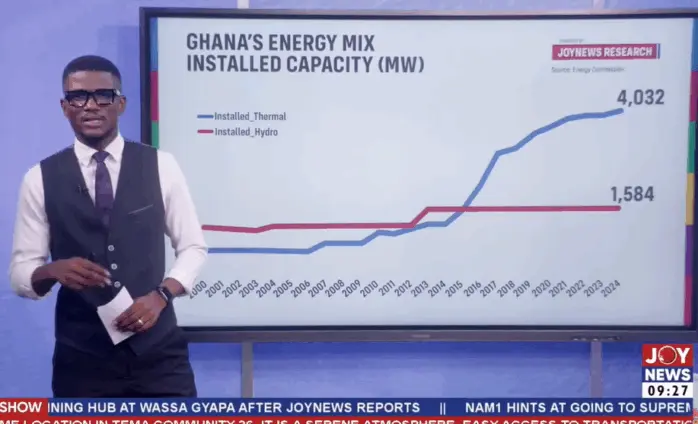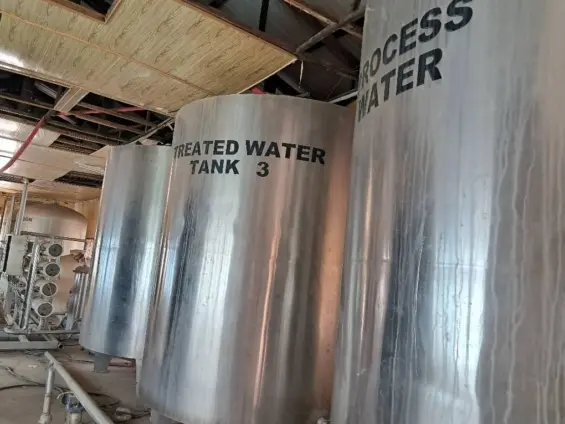Accra, Ghana – The lights are on, powered increasingly by thermal energy, but Ghana’s energy sector finds itself navigating turbulent financial waters. A burgeoning reliance on thermal power generation, while crucial for meeting the nation’s energy demands, has plunged the government into a significant financial predicament, accumulating over $2.5 billion in debt to Independent Power Producers (IPPs). This looming Ghana energy debt crisis threatens the stability of the power supply and casts a shadow over the country’s economic prospects.
For years, Ghana has historically relied on hydroelectric power. Now, however, thermal plants have increased. JoyNews, with insights from energy analyst Isaac Kofi Agyei, recently broke down the complexities and implications of this growing debt. The report sheds light on the factors driving Ghana’s shift towards thermal power and the challenges it poses.
The move to thermal energy represents a significant transition in Ghana’s energy strategy. Several factors contributed to this shift, most notably changing climate patterns affecting the reliability of hydroelectric sources and increased demand from a growing economy. While Ghana has long depended on hydro power from the Akosombo Dam, climate variability has made thermal a critical supplementary energy source. Thermal plants, fueled by natural gas or heavy fuel oil, offered a seemingly reliable and scalable solution to meet escalating energy needs.
Thermal power offered numerous advantages, including increased reliability and scalability. Unlike hydroelectric dams, which are dependent on rainfall, thermal plants can operate continuously, providing a stable power supply, and meeting the burgeoning energy demands of Ghana’s growing economy. However, this reliance comes at a cost. In addition to the debt burden, thermal energy production is associated with environmental concerns, including greenhouse gas emissions, that contribute to climate change. Ghana is actively exploring cleaner energy solutions to mitigate these environmental impacts, including investments in renewable energy sources like solar and wind power.
The core of the problem lies in the accumulated $2.5 billion debt owed to IPPs and fuel suppliers. These IPPs play a vital role in Ghana’s energy sector, collectively contributing a significant portion of the nation’s power supply. However, delayed payments and financial challenges have resulted in a substantial debt. Isaac Kofi Agyei’s analysis from JoyNews offers critical insights into the complexities of this debt crisis. The JoyNews report highlights the unsustainable nature of the debt accumulation and the urgent need for decisive action.
The implications of the Ghana energy debt crisis are far-reaching. The debt threatens the sustainability of the power supply, raising the specter of potential power outages and hindering economic growth. Without reliable and consistent power, businesses will struggle, investments will decline, and the overall economy will suffer. Government initiatives and negotiations with IPPs are underway to address this crisis and find viable solutions. These efforts include exploring debt restructuring options, improving payment mechanisms, and attracting private sector investment in the energy sector.
Isaac Kofi Agyei’s analysis emphasizes the critical need for transparency and accountability in the energy sector. His findings highlight the importance of addressing the underlying causes of the debt accumulation, including inefficiencies in the power generation and distribution systems. Addressing these inefficiencies is vital for ensuring a sustainable energy future for Ghana. To delve deeper into the complexities of the Ghana energy debt crisis and the possible solutions, viewers are encouraged to watch the JoyNews report.
In conclusion, Ghana’s shift to thermal power, while addressing immediate energy needs, has triggered a significant financial crisis, with the government owing IPPs over $2.5 billion. Isaac Kofi Agyei’s analysis underscores the urgency of addressing the debt and ensuring a sustainable energy future for Ghana. The Ghana energy debt crisis demands immediate attention, requiring a multi-faceted approach that combines debt restructuring, improved payment mechanisms, and investments in renewable energy. By working together, Ghana can overcome this challenge and build a more secure and sustainable energy future.
Image Source: MYJOYONLINE


















